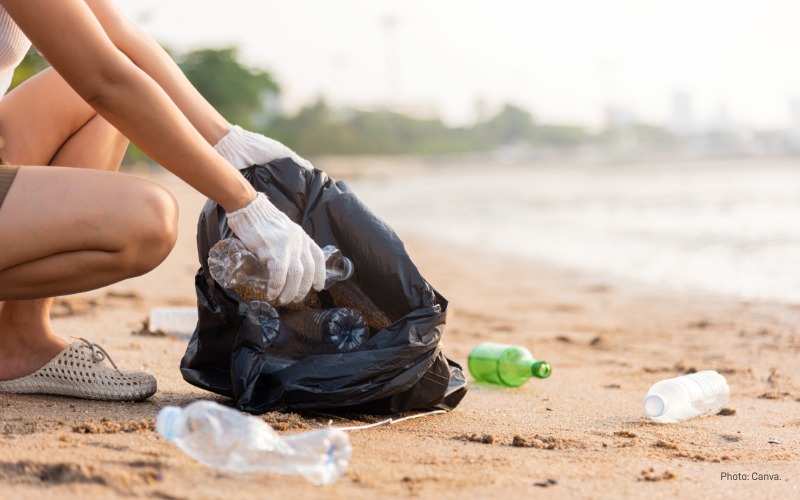
Community cleanups bring people together, have an immediate impact on the environment, and bring light to the detrimental effects of plastic litter on the environment. Photo: Canva.
As sunny, warm days return to New England, my friends and I have a special tradition. We pack our bags for a beach day and a trash cleanup. Last year, we went to Carson Beach in Boston to enjoy the summer breeze. We walked along the beach and collected two full bags of litter, including dozens of bottles, food wrappers, and disposable bags. The main culprit? Plastic! But that wasn’t surprising. Globally, we produce 400 million metric tons of plastic waste each year.
Organizing a trash cleanup will only make a tiny dent in all the plastic we toss, but it’s still a great opportunity to care for the environment, get some steps in, and connect with friends and neighbors. And until we pass stronger recycling laws discouraging plastic from becoming trash in the first place, it’s one simple thing we can do with immediate impact.
We collected some tips to help you organize your cleanup and make it count.
1. Plan Ahead
Sign Up for a Cleanup
Organizing a cleanup can be time-consuming. Before planning your own, take advantage of existing ones that may be happening nearby. Many organizations across New England lead community cleanups throughout the summer and on special holidays like Earth Day.
Get Help
Aside from friends and neighbors, some cities help organize community cleanups. For example, the Office of Civic Engagement in Boston will provide neighbors with tools, bags, and trash collection services. Before you purchase any supplies, do a quick search to find out if your city has a similar program.
Mark Your Calendar, Pick a Spot
Choose a location and date ahead of time so you can prepare. After all, you don’t want to bring your favorite sneakers to a muddy park.
For a bigger impact, think strategically about places rarely cleaned by the city. But stay clear of heavily trafficked areas and other places that could put you at risk.
Gather Your Gear
Here’s a list of some items you should start gathering:
- Cleanup essentials: Bags, gloves, trash grabbers, hand sanitizer
- Safety: Water, sunscreen, sunglasses, hat, first aid kit
- Go the extra mile: Camera, paper and pen for notetaking, trash bins
2. Cleanup Day: Have Fun and Watch Out!
Every Piece Counts
While seeing so much trash littering our neighborhoods is frustrating, remember that collecting even a few pieces of litter sends a message. You’re telling neighbors, the wider community, and even elected officials that trash-strewn parks and streets shouldn’t be the status quo. You’re also highlighting the detrimental impact that plastic has on our planet.
Safety First
Your safety comes first! Dress appropriately and stay hydrated. Avoid picking up hazardous objects, including needles, heavy items, or any other sharp pieces of trash.
3. Packing Up: Make Your Cleanup Count
Cleanup is over – now what? In the best-case scenario, you find no trash – it’s time to go home. But whether you collect a handful of litter or fill up a pile of bags, the following steps can increase the impact of your cleanup.
Document Your Community Cleanup
By documenting litter, you’ll discover what items are turning up as waste. Keep it simple. Take notes on your phone. Do you see any trends? Counting common items – like bottles and cans – will give you a good starting point. But, if you want to take it up a notch, you can also use a form. Check out this trash tally sheet by our partners at the Ocean Conservancy.
For those who find tallying trash less than glamorous, there is still a way to document a cleanup. Take photos! This is a great way to account for items you couldn’t pick up, such as tires or sharp objects.
Recycle Right
Identify recyclable materials and put them in the recycling bin. But remember, not everything can be recycled. Avoid tossing plastic bags, PVC articles, or food wrappers into your bin. Check out our plastic recycling guide for a full list of recyclable items.
Make Some Noise!
This year, my friends and I hope to go the extra mile. After taking photos, we plan to share our cleanup results with our local representatives and ask them to act to free our communities from plastic litter for good.
You can take action, too. Share your photos and results with your elected officials and let them know you want them to pass stronger recycling laws – like bottle bills – to fight litter pollution. You don’t have to write an email; you can post on social media and tag your representative and senator.
Why Should We Treat the Symptoms?
We know that addressing the problem of plastic pollution requires a systemic solution. We also know that cleanups like ours treat the symptoms, not the disease. Yet, we cannot underestimate the impact of community cleanups.
Community cleanups bring people together to see first-hand the impact of plastic and garbage on our environment. But the most meaningful change will happen through collective action. Together, we can push decision-makers to fight for the clean, zero-waste future we deserve.



